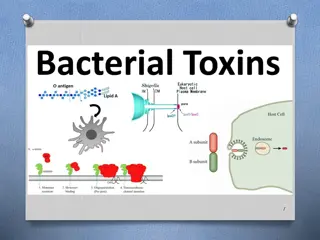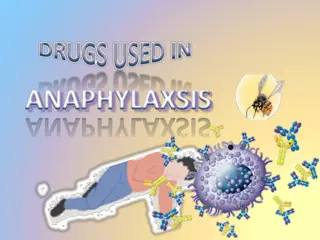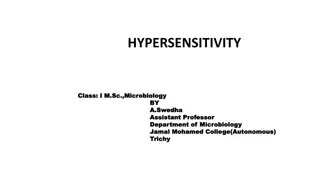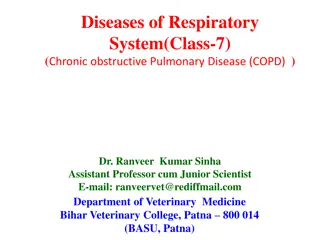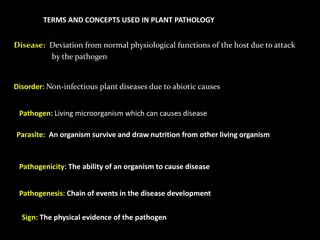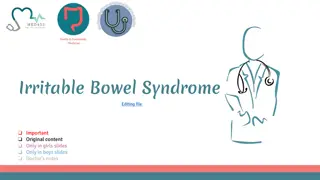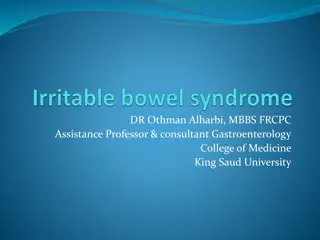Understanding Bacterial Toxins and Cell Damage
Bacterial toxins are poisonous substances produced by microbes that can cause harm to host cells through direct damage, toxin production, and hypersensitivity reactions. Toxigenesis is a crucial mechanism used by bacterial pathogens to induce disease, with endotoxins and exotoxins playing distinct r
2 views • 28 slides
Understanding Allergic Rhinitis: Causes, Symptoms, and Treatment
Allergic rhinitis is an atopic disease characterized by inflammation of the nasal mucosa due to hypersensitivity reactions. It commonly peaks in the second to fourth decades of life, with symptoms such as nasal irritation, sneezing, watery discharge, and more. Risk factors include family history, al
0 views • 10 slides
Understanding Fungi Diversity and Infections in Microbiology
Explore the world of fungi and fungal infections in this foundation block of microbiology. Learn about medically important yeasts, mold fungi, major fungal diseases, antifungal agents, and infection acquisition methods. Dive into hypersensitivity reactions, mycotoxicoses, and various types of fungal
1 views • 19 slides
Understanding Anaphylaxis and Anaphylactic Shock
Anaphylaxis is a severe allergic reaction affecting the entire body, while anaphylactic shock is a life-threatening manifestation of this reaction involving shock and airway swelling. This comprehensive material delves into the nature, causes, symptoms, diagnostic features, emergency management prot
0 views • 18 slides
Understanding Tuberculin Testing in Veterinary Medicine
Tuberculin tests have been vital in diagnosing latent and active tuberculosis in animals for over a century. Different methodologies and types of tuberculin, including avian and bovine, serve to differentiate between various forms of the disease. Procedures like the Single Intradermal Test (SID) are
0 views • 9 slides
Understanding Hypersensitivity Reactions in Immunology
Hypersensitivity in immunology refers to an altered immune response against antigens, leading to hyperreactivity and immunopathology. This article delves into the different categories of adaptive hypersensitivities, focusing on Immediate (Type I), Antibody-Mediated Cytotoxic (Type II), and Immune Co
0 views • 6 slides
Understanding Hypersensitivity Reactions and Classification
Hypersensitivity reactions occur in sensitized hosts following contact with specific antigens, leading to injurious consequences. The Gell and Coombs Classification categorizes reactions into Type I, II, III, and IV based on immune response and duration. Type I reactions are immediate and humoral, w
0 views • 30 slides
Chronic Obstructive Pulmonary Disease (COPD) in Horses: A Veterinarian's Perspective
Chronic Obstructive Pulmonary Disease (COPD) in horses is a respiratory condition caused by hypersensitivity reactions to allergens, viral infections, or bronchopneumonia. This chronic respiratory disease leads to decreased work performance, chronic coughing, abnormal lung sounds, and cardiac dysfun
0 views • 17 slides
Understanding Functional GI Disorders: A Comprehensive Overview
Functional GI disorders encompass a range of conditions affecting the gastrointestinal system, such as irritable bowel syndrome and disorders of the gut-brain interaction. These disorders are characterized by no structural abnormalities but are influenced by factors like motility disturbance, viscer
0 views • 42 slides
Essential Terms and Concepts in Plant Pathology
Plant pathology involves understanding the various terms and concepts related to plant diseases, pathogens, symptoms, and more. From diseases caused by pathogens like Black Wart of Potato to the importance of inoculum potential and hypersensitivity, this field encompasses a wide range of factors tha
0 views • 5 slides
Yellow Fever: Adverse Reactions and Risks
Yellow fever vaccination can lead to severe adverse reactions like anaphylaxis, neurotropic disease, and viscerotropic disease. These reactions can range from immediate hypersensitivity to rare but serious outcomes such as meningitis and multiple system organ failure. The mortality rate associated w
0 views • 11 slides
Understanding Irritable Bowel Syndrome: Pathophysiology, Symptoms, and Management
Irritable Bowel Syndrome (IBS) is a common gastrointestinal condition with uncertain pathophysiology involving factors like motility, hypersensitivity, inflammation, and gut microflora. Symptoms include abdominal pain, altered bowel habits, and bloating. Diagnosis is based on Rome IV criteria, and m
0 views • 9 slides
Understanding Irritable Bowel Syndrome and Its Pathophysiology
Irritable bowel syndrome (IBS) is a common gastrointestinal disorder characterized by chronic abdominal pain and altered bowel habits. Despite the absence of organic causes, patients experience symptoms such as abdominal distention, bloating, and visceral hypersensitivity. The pathophysiology of IBS
0 views • 19 slides
